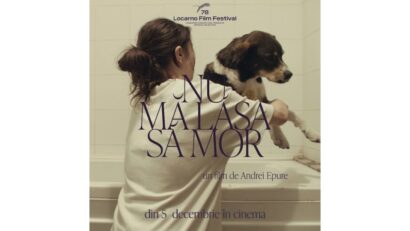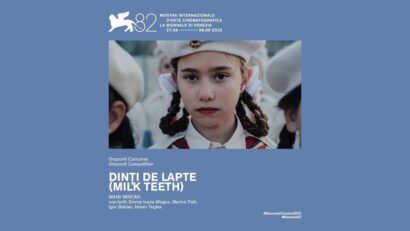The “Interferences” Festival
In early December 2012, the central Romanian city of Cluj Napoca hosted the 3rd “Interferences International Theatre Festival, organised by the Cluj Hungarian State Theatre.

Christine Leșcu, 12.01.2013, 13:22
In early December 2012, the central Romanian city of Cluj Napoca hosted the 3rd “Interferences” International Theatre Festival, organised by the Cluj Hungarian State Theatre.
The director of the theatre, Tompa Gabor, attempted a few conclusions for that year’s edition:
Tompa Gabor: “There have been several remarkable performances. We managed to offer the public a number of diverse shows, which seek to recreate or rethink the relationship between music and theatre, because this is the central theme of this festival, ‘Dialogue between Voices.’ We were careful not to have simultaneous shows, so that everybody may see all the plays. I was happy to see that, mid-way into the Festival, the number of viewers was already higher than in the previous editions … I feel that, for the first time, the people of Cluj Napoca were more interested, more curious than they used to be. Some shows were sold out online, even before the festival began. Stage director Purcarete’s shows, ‘The King Dies’ and ‘Gulliver’s Travels’ set the record in this respect.”
The show “The King Dies”/ “Le Roi se meurt”, which was quite popular among experts and the general public alike, was staged by Silviu Purcarete at “Les Arts et Mouvants”, France. The question that stage director Silviu Purcarete asks in his play, which brings Eugene Ionesco’s absurd theatre closer to the public, is “What kind of seeds does a dying man sow?” Here is Silviu Purcarete:
Silviu Purcarete: “I find the text quite clear and very well written. Of course, it is a bit excessive, in quantitative terms, and we had to cut out a lot of it for the show. We focused on story-telling, on making a show which is quite basic, almost without a stage set, with just a few props… The play relies on what the text actually offers, we needn’t look for anything else. The theme is already complex enough, because it discusses something that is not part of a shared experience, something all of us will go through alone. Trying to complicate that would have been too much. The play is about the mystery, agony and inscrutability of this individual experience, as well as about how this reflects on the others. And this is, most of the times, grotesque and comical.”
In a year that UNESCO dedicated to the great Romanian playwright I. L. Caragiale, the Interferences Festival was bound to include performances based on Caragiale’s works. The Cluj Napoca State Theatre, the host of the event, presented a show called “Leonida Gem Session”, adapted by Tompa Gabor and Andras Visky from the works of Caragiale. The play is structured into three parts. The first one includes files from the archives of the communist political police, the Securitate, the second one comprises the actual play written by Caragiale, “Don Leonida and the Right-Wing Conspiracy,” while in the third part, a character from the play, a maid called Safta, is turned into a symbol of ultimate reality. Andras Visky explains:
Andras Visky: “When reality invades this media-dominated world, this world must be confronted with a marginalized reality.”
Director Tompa Gabor explains where the idea of the performance came from.
Tompa Gabor: “Re-reading ‘Conu’ Leonida’ , the only of Caragiale’s plays that I had not directed, I understood that it is actually divided in two. The first part is about glorifying the revolution, a revolution of words rather than a real one, and the second one is about the fear of a real revolution. And then the play started to talk to me about the need to reflect on the 23 years that have passed since December 1989. In order for us to get free and prevent us from being stifled by this recognition, we should carry through the process of rendering our near past transparent. I thought that the characters could be some code names for a social class that dominated the last decades before 1989 and which, I believe, has not totally disappeared, because we have not publicly ended the process of x-raying this phenomenon.”
The 2012 Interferences Theatre Festival, had the logo dialogue among voices”, so musicians were among the guests. Composer Vasile Sirli, the one who wrote the music for both The King Dies” and “Leonida Gem Session”, talked at a meeting with the public about his interest in theatre music.
Vasile Sirli: “I’m interested in getting to know people through music and letting them enrich me. I work with them as if I worked with musicians, with people who are specialists in literature, of which I know almost nothing. I’m interested in their musicality, even when they do not have an ear for music, I’m interested in their rhythm, even when they can’t make the distinction between one and the other. I’m interested in providing them with some elements of musical logic. And I think it’s very important for actors, the director, the stage director, to all participate in a show where the music is adopted. I’ve always seen myself as adopted by theatre.”
In figures, the 2012 Interferences International Theatre Festival was: 13 days of events, 21 performances, 9 countries. However, the program also included concerts, book launches, workshops, photo and musical installations exhibitions, discussions with the public. The third edition, dedicated to the dialogue between theatre and music, was also a platform for the performances given by the members of the European Theatres’ Union.






























